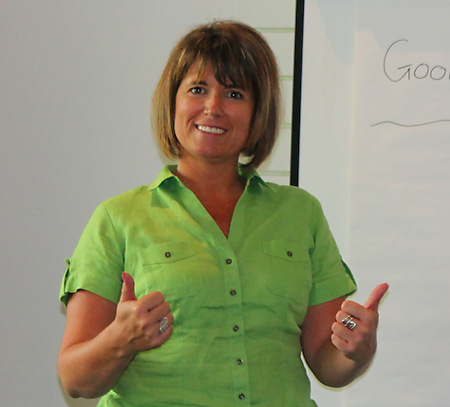Deaf Studies Corner2nd September 2015
At the start of another year of teaching BSL, motivations to learn seems to be changing
Learning BSL is not just about getting a job for some, it is about wanting to chat to Deaf people

No sooner has one academic year finished than we are enrolling again for a new year at college. When it comes to adult learning and the BSL courses, I am always grateful for the number of people who want to start their journey into British Sign Language, with an increasing number of deaf people also joining the courses.
This year, more than 40 people have registered to enrol on the Level 1 course with more expected to come along in the coming days. At £140 for the year, the course is an affordable way for people to develop the basic skills needed to have a conversation with a Deaf person who signs, the fee covering 35 weeks of tuition as well as the exam fee. As in previous years, I am always a bit taken back by one or two responses I get from people working with deaf children or adults who enquire about the BSL courses, ask about the fee, and leap backwards in shock at the £140 price tag! Why is it that anything to do with teaching BSL or Deaf Awareness is expected for free or a knock down price?
 Over many years, the vast majority of people learning BSL have been women, quite often a class of 16 having no men at all. Pleasingly, that is starting to change, with more and more men putting their names down to learn, although they tend to be learning for different reasons to most of the ladies on the course. As a member of the Deaf community, I am always interested in the reasons behind people wanting to learn BSL, with that question central to the pre-course interview that is undertaken, to see if people will be offered a place.
Over many years, the vast majority of people learning BSL have been women, quite often a class of 16 having no men at all. Pleasingly, that is starting to change, with more and more men putting their names down to learn, although they tend to be learning for different reasons to most of the ladies on the course. As a member of the Deaf community, I am always interested in the reasons behind people wanting to learn BSL, with that question central to the pre-course interview that is undertaken, to see if people will be offered a place.
Apart from the course participants being primarily women, there is a significant diversity of applicants and their motivation for learning BSL. Increasingly, school and university students are taking part, learning BSL whilst also undertaking their full time academic studies. In the last few years, courses have usually attracted people working in school and college settings as Communication Support Workers for Deaf children and it is always interesting to see the different attitudes those students have to learning and using BSL, but also to the history of Deaf education and Deaf history.
 It may be me being overly optimistic, but more and more people seem to be learning because they have a deaf child or other family member and they now see BSL as an essential way to communicate in the family environment. These students usually pay for their own course, so it quite often follows that they attend more regularly than students who have their fees paid by their employer, and their attitude and openness to learning is top class. From a teacher's perspective, it feels like learning is important to people who want to learn to communicate with family members, and consequently, they tend to do better throughout the year and in the exams.
It may be me being overly optimistic, but more and more people seem to be learning because they have a deaf child or other family member and they now see BSL as an essential way to communicate in the family environment. These students usually pay for their own course, so it quite often follows that they attend more regularly than students who have their fees paid by their employer, and their attitude and openness to learning is top class. From a teacher's perspective, it feels like learning is important to people who want to learn to communicate with family members, and consequently, they tend to do better throughout the year and in the exams.
 Enrolling students now, I've already come across some interesting people and some diverse reasons behind their involvement on the course. It should make for interesting classes I think. With a life long interest in Deaf education, especially that of Deaf children, I have been delighted to see Grand Parents of a little Deaf girl enrol. They told me that the little girl is due to have bilateral cochlear implants fitted in a few weeks time, but as a family they had decided to learn sign language so that they had different options for communicating with her as she grows older, especially when she was not wearing them. They were also keen to give her every available communication option as she grows older, rather than hope that voice works for her and that she is given equality of opportunity within mainstream life. Mum and dad had already undertaken an intensive course, with both sets of grand parents now enrolling to learn sign language as well. Typically Deaf already, the little girl had eyes everywhere, taking in everything visually. In an instant she was able to learn the sign for hanging lights from the ceiling.
Enrolling students now, I've already come across some interesting people and some diverse reasons behind their involvement on the course. It should make for interesting classes I think. With a life long interest in Deaf education, especially that of Deaf children, I have been delighted to see Grand Parents of a little Deaf girl enrol. They told me that the little girl is due to have bilateral cochlear implants fitted in a few weeks time, but as a family they had decided to learn sign language so that they had different options for communicating with her as she grows older, especially when she was not wearing them. They were also keen to give her every available communication option as she grows older, rather than hope that voice works for her and that she is given equality of opportunity within mainstream life. Mum and dad had already undertaken an intensive course, with both sets of grand parents now enrolling to learn sign language as well. Typically Deaf already, the little girl had eyes everywhere, taking in everything visually. In an instant she was able to learn the sign for hanging lights from the ceiling.
 One mum enrolled so that she could communicate in sign language with her daughter who was learning Baby Sign. With knowledge of over 100 signs already, mum told me that her little girl was using signs all the time in the house even though she is pre-speech, and she explained how much better communication with this child was compared to her eldest daughter. Expecting the daughter to be Deaf, I was surprised when mum told me she wasn't, they just felt that as communication was so important, they thought it was a fantastic way to be able to communicate with their little one, before and indeed after, she started to speak.
One mum enrolled so that she could communicate in sign language with her daughter who was learning Baby Sign. With knowledge of over 100 signs already, mum told me that her little girl was using signs all the time in the house even though she is pre-speech, and she explained how much better communication with this child was compared to her eldest daughter. Expecting the daughter to be Deaf, I was surprised when mum told me she wasn't, they just felt that as communication was so important, they thought it was a fantastic way to be able to communicate with their little one, before and indeed after, she started to speak.
 It has also been nice to have a few couples joining as a result of one of the partners becoming deaf. I know it's harder to learn new things as you get older, but we all have capacity to learn right the way up to our dying day. Delighted by their decision to learn, I know I'll be doing my utmost to make sure these couples get as much from the course as absolutely possible, as the ability to communicate with our partners and families is so important.
It has also been nice to have a few couples joining as a result of one of the partners becoming deaf. I know it's harder to learn new things as you get older, but we all have capacity to learn right the way up to our dying day. Delighted by their decision to learn, I know I'll be doing my utmost to make sure these couples get as much from the course as absolutely possible, as the ability to communicate with our partners and families is so important.
For the first time in my teaching career, a man I went to school with and who was educated in the same Hearing Impairment Unit as me has joined one of my courses. Whilst a few years older than me, our schooling was the same and it is interesting that this is the first time he has looked to learn sign language. Having experienced communication barriers all of his adult life and relying on his wife to communicate for him, he is hoping that being able to use BSL will give him more independence. Another lady also put a smile on my face. She works in a HR department and wants to learn so that she can chat to some Deaf men who work on the factory floor.
Of course, in amongst all the good and valiant motivations for learning, there is also the odd reason that leaves me a little deflated. Being an idealist, I like to think that people want to learn for noble and social reasons, to be able to chat to me if someone meets me out socially perhaps, but for some, it seems it's just about them. "I need it to get my job", or, "I am applying for a job and if I get it, I will have to learn BSL," and even, "I'll get more money if I pass the course."

I still had a smattering of those latter comments, but generally, I think motivations and the learner base is changing. Increasingly, students setting out on Level 1, talk convincingly about their desire to progress through the levels so that they become fluent, not just get their Level 1 or Level 2 as that is what they need to work with Deaf children. Most students understand that introductory levels allow light touch 'topic based' conversations with Deaf children and adults, and that it is only through a commitment to longer term learning that true proficiency will follow and serious conversations can take place.
At the start of another year I once again feel excited and bubbly about the up-coming BSL provision, I just hope I feel the same at the end of year!
Article by Deaf BSL Teacher
posted in Deaf Lifestyle / Deaf Studies Corner
2nd September 2015





